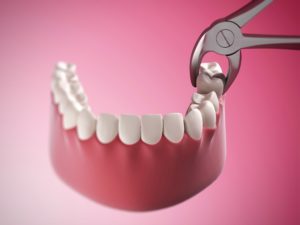What Does a Tooth Extraction Feel Like?
May 13, 2023
 Dentists always strive to preserve every natural tooth because each one is vital for your oral health and functions. However, extraction is best in certain situations, like impacted wisdom teeth or preparation for dentures. No matter the reason, it’s normal to have a little anxiety about the road ahead. Don’t worry, here are 4 things you can expect during your extraction.
Dentists always strive to preserve every natural tooth because each one is vital for your oral health and functions. However, extraction is best in certain situations, like impacted wisdom teeth or preparation for dentures. No matter the reason, it’s normal to have a little anxiety about the road ahead. Don’t worry, here are 4 things you can expect during your extraction.
1. Numbing Medication or Sedation
You don’t have to worry about a painful day in the dentist’s chair because they will keep your comfort as their top priority. Depending on your situation, they’ll recommend a numbing medication, sedative, or both. After administering any medication to ensure you are comfortable, they’ll begin the procedure. You may feel some pressure or unusual sensations, but you will not have any outright pain.
2. Extracting Your Tooth
Extracting a tooth can look different for everyone because each situation is unique. During your initial consultation, your dentist will determine which type of extraction you’ll require to remove your tooth. Depending on your needs, you can expect:
- Simple Extraction: Your dentist will loosen the tooth and extract it with forceps.
- Surgical Extraction: The gum tissue is opened to expose the tooth, which may be broken into smaller pieces before being taken out.
3. Closing the Extraction Site
Your dentist may close the extraction site using sutures, but it isn’t always necessary. They will explain if they are needed and any aftercare instructions.
4. Controlling Bleeding
Your dentist will apply gauze to the extraction site to allow a blood clot to form. You’ll need to bite on gauze for at least 30 minutes, changing it as necessary. It’s not unusual for light bleeding to continue for about 24 hours.
Recovering from Tooth Extraction
Your extraction will be pain-free, but you can expect some tenderness after the effects of any sedatives or numbing agents dissipate. It’s best to spend the rest of the day recovering at home. Your dentist will instruct you to avoid any strenuous activities for about 1 week.
Take an over-the-counter or prescribed pain reliever to manage your discomfort. Apply a cold compress to reduce swelling and bruising. Your dentist will also discuss dietary instructions and explain how to care for your mouth as you heal.
The blood clot isn’t lost too soon, so avoid smoking, drinking through a straw, and don’t vigorously rinse your mouth. Within a few days, you’ll be back on your feet to resume your regular diet and activities.
If you have any questions about your treatment, don’t hesitate to ask your dentist for clarification.
About Dr. Corey Martinez
Dr. Martinez earned his dental degree at the Indiana University School of Dentistry and has regularly continued his education in advanced services, like endodontics and oral surgery. He is proud to be a member of several professional organizations, including the American Dental Association. If you need to have a tooth removed, request an appointment through our website or call (317) 659-9335.
